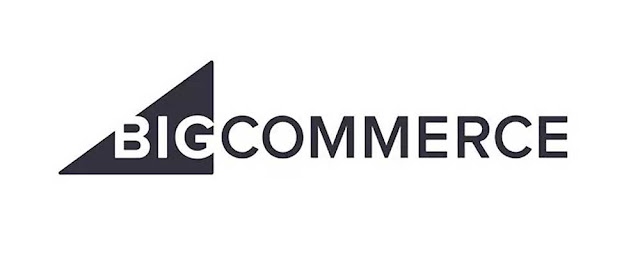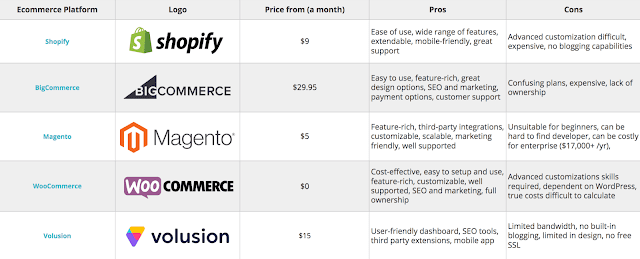What's The Best eCommerce Platform?
 |
| What eCommerce Platform is the Best...? |
Comparing eCommerce Platforms
Before we begin, let's acknowledge that amid this cutthroat competition, only the right combination of business model and ecommerce platform will survive because your traction in the ecommerce world depends a lot on the kind of technology you are equipped with but also how you promote and market your store and products elsewhere. Whether you want to launch a conventional ecommerce store, or a multi-vendor marketplace, this list will save you some research work.
For anyone who is planning to start a new ecommerce business, it's important to first understand how digital commerce has evolved in past 5 years and where it is heading. Beyond mobile and social, we've seen just about every aspect of ecommerce evolve. The major highlights that will shape and influence ecommerce now and in the future are things like artificial intelligence, user customization, digital wallets, mobile Payments, data analytics. With these developments in mind, I have assembled my top 5 ecommerce platforms with my own personal recommendation in the conclusion. Ultimately, however, only you can determine which platform is best for you.
1. Shopify
 |
| Shopify eCommerce |
A Canadian-based ecommerce solution, Shopify has been helping online businesses across the globe with a sharp focus on the trending social commerce and mobile shopping. Founded in 2004, Shopify has always kept up with the pace of evolving ecommerce trends and technologies, having broken ground on powerful additions such as social shopping whereby your customers never leave their social media platform in order to buy from you, an excellent addition for online businesses considering the constant traffic on social media sites such as Facebook and Instagram. For as little as $9 per month, you can integrate Shopify directly with your FB account and make it an ecommerce store.
Shopify is extremely user friendly and it suitable for novice users or experienced web developers with both a WYSIWYG editor and full access to the stores code you can design and style your online store whatever way you want with no restrictions. Their very own app store also allows users to integrate features they are unable to programme themselves and every shopify account comes with excellent tech support.
There are a wide range of excellent templates available, both free and premium, but none are overly expensive and the free themes are actually to a very high standard.
Shopify is extremely user friendly and it suitable for novice users or experienced web developers with both a WYSIWYG editor and full access to the stores code you can design and style your online store whatever way you want with no restrictions. Their very own app store also allows users to integrate features they are unable to programme themselves and every shopify account comes with excellent tech support.
There are a wide range of excellent templates available, both free and premium, but none are overly expensive and the free themes are actually to a very high standard.
Even with all the advantages of Shopify mentioned above, there are some downsides with the platform. The most prominent downside is the additional transaction fee you'll be liable to pay if you don't use the Shopify Payment Gateway (although you can integrate your own). Moreover, some useful and practical extensions require additional investment, though this is the case with almost all eCommerce platforms. Perhaps most challenging is "Liquid," Shopify's own coding language, which is only really editable by experienced programmers.
The Verdict:
Beginner level ecommerce entrepreneurs who need a conventional ecommerce solution can benefit from Shopify. It is easy to use and can help you launch your ecommerce business quickly. Based on your requirements and your budget, you can choose from Shopify packages that range from $29 to $299 per month. It is also highly scalable and your store can easily adapt as your business grows.2. Magento
 |
| Magento eCommerce |
Released in March 2008, Magento is an open source ecommerce website platform. Its reliability and scalability has made it one of the most popular ecommerce platforms available today. Many prominent names such as Burger King, Huawei, Pepe Jeans and Liverpool F.C. have their websites built on Magento.
Using Magento is not for everyone, especially if the store owner is not a programmer, or doesn't have a team of programmers working on his or her team. And then there's the price tag; the basic version is free, but getting an enterprise version means you'll need to shell out at least $20,000/year. If you don't have programmers on staff, be prepared to invest in third-party programming costs as well.
The Verdict:
For Enterprise level online stores with a huge volume of products, Magento is the right choice. Not recommended for SMBs due to its complex store setup, cost and highly technical management requirements.3. Volusion
 |
| Volusion eCommerce |
Specially designed for startups and SMBs, Volusion is a turnkey ecommerce solution and features rich ecommerce marketplace solution to build multi-vendor stores such as Amazon, eBay, and Etsy. While many other ecommerce platforms, like Shopify, offer a multi-vendor version, Volusion specializes in this particular field. It's multilingual and multi-currency features allow store owners to expand their reach on a global level. And then there is the plethora of payment gateways, in-built analytics tool, rewards and discount coupon management features.
Volusion has a couple of downsides, though including limitations on bandwidth which can affect your store speed - a major concern for mobile users. There is also no built in blogging system and although you can add your own this is additional work and a little extra hassle compared to other platforms. Blogging can also help drive traffic to your store so I would recommend having a blog on your store. The SSL certificate does not come as part of your user account and is an additional cost, and considering buyers are told not to trust stores without an SSL then it is a cost that you will really have to incur.
The Verdict:
SMBs can use Volusion to its full potential. The startup package is the most affordable at $250 and offers hosted solution for one year license. This is a pragmatic method to test the viability of your business model. Once you are sure of your business, you can easily upgrade to higher versions.4. BigCommerce
 |
| BigCommerce eCommerce |
Since its inception, BigCommerce has more than 55,000 online stores to its credit and is lauded as one of the most prominent ecommerce software providers. From famous companies such as Martha Stewart & Toyota to many SMEs, BigCommerce has helped businesses of all sizes launch their online storefronts. For ecommerce store owners who lack basic coding skills, the vast list of BigCommerce's built-in features come in really handy.
For those who wish to start a multi-vendor store such as one on Amazon may find BigCommerce lacking some of the available support other ecommerce platforms provide with more integrated marketplace models. Another concern with BigCommerce may be the lack of free themes. With only 7 free themes, BigCommerce lags behind other ecommerce platforms, given the fact that most of them offer more than 20 free themes. But that doesn't change the fact that you get a multitude of premium themes and plenty of customization options to give your store a unique identity.
The Verdict:
BigCommerce is an ideal solution for ecommerce entrepreneurs who want a full-fledged store without the hassles of coding, integrating plugins and other technical hurdles. If you can make do with the lack of free themes, or want to spend on a premium theme, BigCommerce is a great ecommerce platform solution.5. WooCommerce
 |
| WooCommerce eCommerce |
A free WordPress plugin, WooCommerce is a name that needs no introduction in the world of ecommerce. It comes along with a secure payment gateway and a shopping cart that both work really well. Open source and easy to use for WordPress aficionados, WooCommerce needs an additional plugin to start a multi-vendor ecommerce store.
Installing WooCommerce is free, but integrating the shopping cart completely with the system requires additional investment. Moreover, if you don't know WordPress, you won't know how to use WooCommerce. But the biggest problem with WooCommerce is its lack of scalability; as your business grows and you get more sellers, products and customers on your database, WooCommerce starts slowing down.
The Verdict:
WooCommerce is a viable option if you want to stick to WordPress websites and don't anticipate having a large, high-volume store. Avoid if you are hoping to grow and scale up as you will only end up having to change platform.Conclusion:
 |
| eCommerce platforms compared |
EDIT: The graphic above says Shopify has no blogging capabilities - this has now changed and Shopify includes and integrated blog area with your online store.
An ecommerce platform is not a "one size fits all" solution that will work for everyone. All the ecommerce platforms discussed in this article are built for different kinds of business requirements. The pros and cons outlined are not about what's wrong with them. The curated list is designed to help you make a calculated decision and choose a platform that serves your needs best. With that said, if you are looking for an expert opinion then I would recommend Shopify. I use it regularly when designing eCommerce stores for clients and bot myself and my clients find it an excellent solution to their eCommerce business needs.
What's The Best eCommerce Platform?
 Reviewed by Opus Web Design
on
June 24, 2019
Rating:
Reviewed by Opus Web Design
on
June 24, 2019
Rating:
 Reviewed by Opus Web Design
on
June 24, 2019
Rating:
Reviewed by Opus Web Design
on
June 24, 2019
Rating:
















